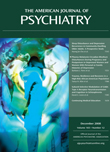Sleep Disturbance and Depression Recurrence in Community-Dwelling Older Adults: A Prospective Study
Abstract
Objective: A prior depressive episode is thought to increase the risk of depression. However, among older adults with prior depression, it is unclear whether sleep disturbance predicts depression recurrence independent of other depressive symptoms. Method: A 2-year prospective cohort study was conducted with 351 community-dwelling older adults ages 60 years and older: 145 persons with a history of major or nonmajor depression in full remission and 206 without a prior history of depression or any mental illness. The participants were assessed at baseline, 6 weeks, 1 year, and 2 years for depressive episodes, depressive symptoms, sleep quality, and chronic medical disease. Results: Twenty-three subjects (16.9%) with prior depression developed depressive episodes during follow-up, compared to only one person in the group without prior mental illness (0.5%). Within the group with prior depression, depression recurrence was predicted by sleep disturbance, and this association was independent of other depressive symptoms, chronic medical disease, and antidepressant medication use. Conclusions: This study is the first to demonstrate that sleep disturbance acts as an independent risk factor for depression recurrence in community-dwelling older adults. To identify older adults at risk for depression, a two-step strategy can be employed, which involves assessment of the presence of a prior depressive episode along with sleep disturbance.



